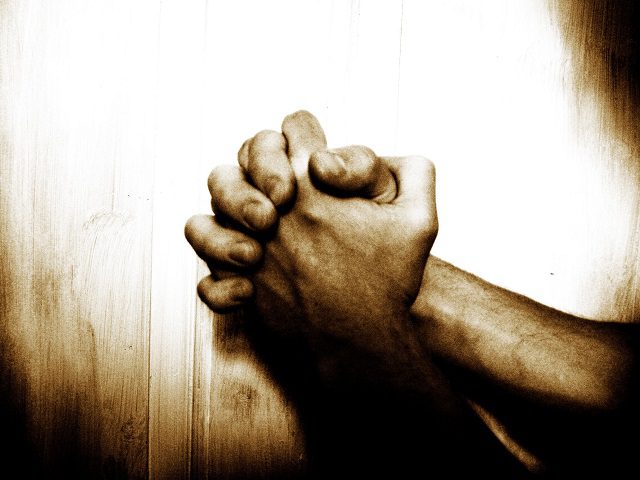
This was my reply to an inquirer on the Coming Home Network board, where I was a moderator from 2007-2010. I believe he is a Protestant now, looking into the Catholic faith. His words will be in blue.
* * * * *
Why would I want to pray to any saint rather than pray directly to the Father in Jesus Name? That for me is the biggest sticking point. The Gospels point to Jesus showing us the Father directly.
Of course any of us can do that. The Bible emphasizes relationship to God, as sons and daughters to a Father. There is no question about that. But this notion is not the sole domain of Protestants (as they too often seem to think). It is also a “Catholic thing” and strongly part of our spiritual and contemplative tradition (as I noted in one of my papers).
That said, there is also the practice of praying for each other. Protestants do that. So do we. But how do we go about it? Even in the Protestant worldview, there is this notion of “getting a holy man [or the pastor, etc.] to pray for you.” Hence, a person would, e.g., ask Billy Graham to pray for them, because it is thought that somehow his prayer might have more effect. This intuition is actually based on explicit biblical testimony:
James 5:14-18 (RSV) [14] Is any among you sick? Let him call for the elders of the church, and let them pray over him, anointing him with oil in the name of the Lord; [15] and the prayer of faith will save the sick man, and the Lord will raise him up; and if he has committed sins, he will be forgiven. [16] Therefore confess your sins to one another, and pray for one another, that you may be healed. The prayer of a righteous man has great power in its effects. [17] Eli’jah was a man of like nature with ourselves and he prayed fervently that it might not rain, and for three years and six months it did not rain on the earth. [18] Then he prayed again and the heaven gave rain, and the earth brought forth its fruit.
Note here that the Bible itself recommends asking someone else to pray: “the elders” of the Church, who, like other Church leaders (1 Tim 3:1-13; Titus 1:7), are supposed to be of exemplary character, and “worthy of double honor” (1 Tim 5:17). They have more power, due to their ordination. In fact, this is a text we bring up in relation to the sacrament of anointing (also known as “extreme unction” or “last rites”: when a person is dying). So we ask them to pray due to the greater power they have in terms of a possible miracle occurring, or supernatural grace being imparted through them. They have more than we do ourselves; therefore, we ask them to pray.
To nail down his point, St. James cites the example of the prophet Elijah. When he prayed, it didn’t rain for three-and-a-half years. James says this was the case because (here is the principle he wishes to convey): “The prayer of a righteous man has great power in its effects.” We see the same dynamic in the following passage:
1 Kings 13:6 And the king said to the man of God, “Entreat now the favor of the LORD your God, and pray for me, that my hand may be restored to me.” And the man of God entreated the LORD; and the king’s hand was restored to him, and became as it was before.
This is the biblical rationale for asking others, of more spiritual stature in the kingdom, or holier (or, best of all, both!) to pray for us. But that is not yet the same as asking a (dead) saint to pray for us. How does one arrive at that conclusion? It takes a little more work, but it is possible to ground it, too, in Scripture by less direct, explicit biblical data.
In Revelation 5:8, the “twenty-four elders” (usually regarded by commentators as dead human beings) “fell down before the Lamb . . . with golden bowls full of incense, which are the prayers of the saints.” They appear to have other people’s prayers, to present to God. So the obvious question is: what are they doing with them? Why does Revelation present dead saints presenting the prayers of other saints to God?
If they have them, it stands to reason as a rather straightforward deduction, that they heard the initial prayers as well, or at least were granted knowledge of them in some fashion, granted ultimately through the power of God. Revelation 8:3-4 is even more explicit. Rather than equate incense and prayers, it actually distinguishes between them, and presents the scenario that the prayers and incense are presented together:
- And another angel came and stood at the altar with a golden censer; and he was given much incense to mingle with the prayers of all the saints upon the golden altar before the throne; [4] and the smoke of the incense rose with the prayers of the saints from the hand of the angel before God.
So the question, again, is: what is this angel doing with “prayers of the saints” — presenting them to God? It seems clear to me that they have heard the prayers, and are involved as intercessors. Angels are extremely intelligent beings. We know that they rejoice when a sinner repents. They have knowledge in ways that we do not; above our comprehension.This is biblical proof that dead saints and angels both somehow have our prayers and present them to God. They are acting as intercessors and intermediaries. How do they hear our prayers? God gives them the power to do so because they are in heaven and therefore, outside of time. They are aware of earthly events. We know that from Hebrews 12:1 (“we are surrounded by so great a cloud of witnesses”), and from Revelation 6:9-10, where dead saints are praying for those on the earth.
We also know of several incidents where dead men (even some from heaven) interact with those on earth: the Transfiguration (Mt 17:1-3 / Mk 9:4 / Lk 9:30-31), the Two Witnesses of Revelation 11:3-13, the prophet Samuel (not just a demon impersonating him: 1 Sam 28:7-20), and “many bodies of the saints” that came out of their graves after Jesus’ Resurrection and went into Jerusalem, appearing to many (Mt 27:50-53). In the deuterocanonical book of 2 Maccabees (15:13-16) the prophet Jeremiah returns to earth.
This is our entire rationale for asking saints to pray to God for us: all from the Bible:
- 1) Holy men and women’s prayers have great power.
- 2) Dead saints are perfected in holiness and are still part of the Body of Christ.
- 3) The Blessed Virgin Mary in particular is exceptionally holy (Immaculate Conception) and as the Mother of God, her prayers have more power and effect than that of any other creature: all by God’s grace.
- 4) We know that they are aware of what goes on in the earth.
- 5) We know that they exercise much charity and pray for us.
As I’ve just shown, I think, it certainly is that!
I think we see enough to establish the principle. It’s not required to have a lot of material in the Bible about something in order for it to be believed and followed. For example, the Virgin Birth is based on very few passages (just two or three, I believe), but it is firmly believed by all Christians. Original sin is referred to only very rarely in Scripture, but it is accepted by almost all Christians (the Churches of Christ being a rare exception).Secondly, doctrines concerning the angels and the afterlife and last things were at a young stage of development at the time the NT was compiled. Many of them were highly developed in the inter-testamental period, and so we see much more of these doctrines in the Deuterocanon that derives mostly from that period of time.This is why, e.g., the Sadducees rejected the resurrection of the dead and late Jewish angelology and eschatology. That is because they accepted only the written laws of the Torah (first five books), and these scarcely discuss those issues. They were sort of like the “Scripture Alone” folks of their time. The Pharisees, on the other hand, accepted all these doctrines, which is why Jesus operated within that tradition, and why Paul called himself a Pharisee three times, even after his conversion. They accepted the oral Torah as well as the written, and these later traditions.
So this is why there isn’t a whole lot in the NT about these practices. That’s okay, because even important doctrines like the Holy Trinity or the Two Natures of Christ were developed a lot further for 600-700 years after the Bible. That shouldn’t surprise or trouble us. In other words, if even things like the Trinity, Christology, and original sin develop a lot in the post-biblical period, then it is no more difficult to believe that the Catholic doctrines of the communion of saints, and intercession and invocation of the saints also do so. There is enough in the Bible to show that it is perfectly harmonious with Christianity. And there is a ton of patristic testimony, too.
Because there are relative degrees of power and “efficiency” so to speak, in a holier or ordained person interceding for us. If we ask the holiest person we know to pray for us, the prayer is more likely to succeed than if we pray it. We know this from the explicit biblical testimony of James 5. It’s not even speculation or deduction. It’s right there, and undeniable.Since Mary is the holiest and most important creature, then by this (biblical) reasoning it is better to ask her to pray than to ask anyone else to pray for us. All the prayers eventually go to God. They are interceding for us. The power of the created saint comes entirely from God’s grace. That’s why Mary, too, called God her savior. He saved her by preventing her from sinning, by granting her the unmerited grace of the Immaculate Conception, before she knew anything at all about anything.
They have created a false dichotomy that the Bible and Catholic tradition does not do. You can always find people ignorant of the finer details of their own faith. They haven’t studied enough. They simply follow some practice that is modeled by someone they know. But this has no bearing on what the official teachings of Catholicism are. At best you might say that their local priest has failed in educating them properly. But they have a responsibility of their own to learn their faith, too.
If a saint is truly being thought of as a replacement for God, and an end in and of himself, then it is idolatry. If it was thought, for example, that Mary could grant requests in and of herself, without the grace of God, as if she were self-sufficient (in effect, like God), that would clearly be Mariolatry and rank idolatry, since that is a replacement of God Himself. In the Catholic view, saints reflect God’s glory. They are intermediaries; vessels. Mary points inquirers to her Son, Who is God. She doesn’t lift up herself.
The Church decides, by the guidance of the Holy Spirit and charism that she has, that a person is sufficiently holy to be regarded as now in heaven. It is part of what we believe is special divine guidance. Obviously, no biblical argument can be made for particular saints (except the few whom we know came back to earth: such as Moses and Elijah). But we know as a general principle that holy people are saved, and will go to heaven. We believe in faith that the Church can have knowledge of the destiny of the holiest persons.
By examining the life of a saint and seeing what the Church has taught about them. If they were holy, the fruit will be evident, by Jesus’ principle: “the tree is known by its fruit.” You know about the Biblical saints from inspired Scripture itself. So you can ask Paul or Mary or Peter to pray for you, and not have to worry about possible historical mistakes. Your data about them is itself inspired (God-breathed).













